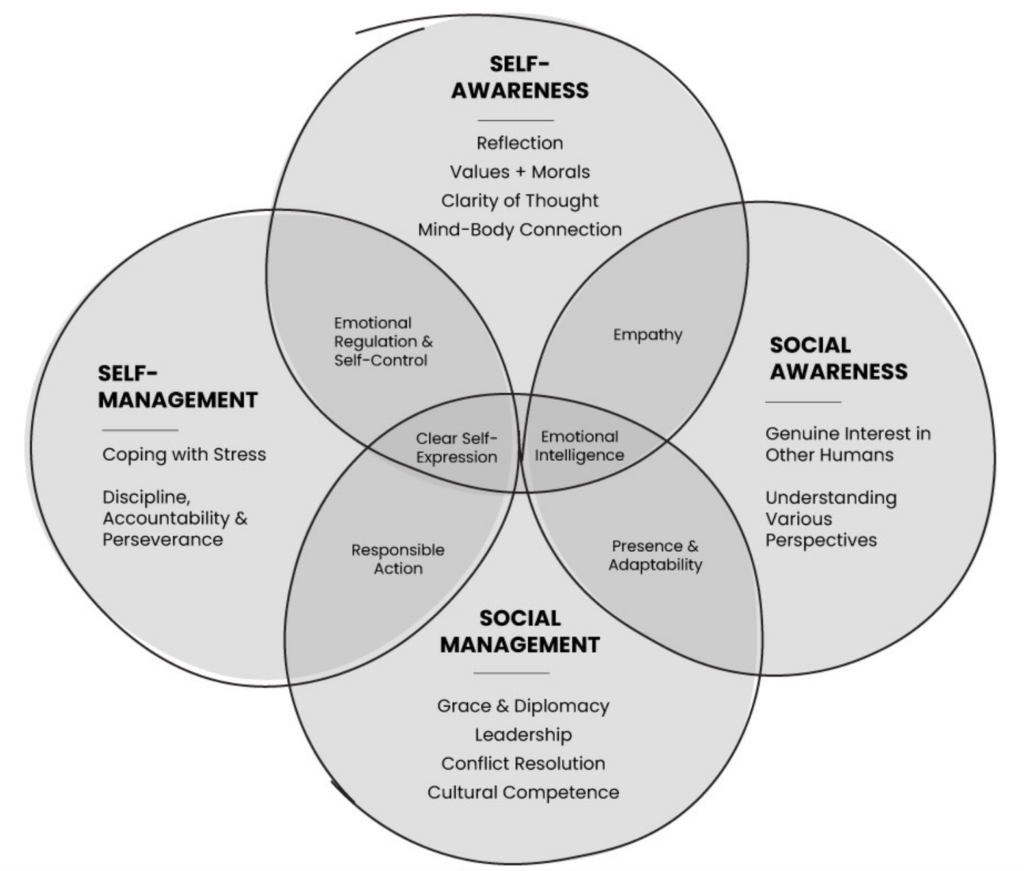How to Improve Social Skills: Develop Your Social Management Skills
Social awareness—the ability to pick up on the emotions of others—is a valuable skill. However, without social management skills, awareness alone can lead to passivity rather than connection. Learning how to improve social skills will help translate that awareness into engagement.
If you’re naturally observant and reflective, you might struggle to actively participate in conversation or assert yourself in groups. This makes you feel like an outsider, despite your understanding of the social landscape.
How to improve social skills: Translate Your Awareness into Action.
Look at human intelligence and wellness across four pillars:
-
- Self-Awareness (Know Yourself)
- Social Awareness (Know Others)
- Self Management (Lead Yourself) (Action-Oriented)
- Relationship Management (Manage Relationships) (Action-Oriented)

Understand Your Strengths and Areas for Growth
Clarity on how to improve social skills and lead balanced lives requires skills derived from each quadrant. Use this as a roadmap for assessing your current strengths and charting a path for growth in other areas.
✅ Having Social Awareness without ⛔ Social Management
Do you identify as the “quiet type?” If you have strong social awareness but aren’t sure how to improve social skills, you might need social management skills.
While your ability to understand outside perspectives is strong, navigating social interactions can feel challenging. This often leads to disengagement, withdrawal, or alienation.
How to Improve Social Skills Through Observation and Preparation
The antidote to nervousness is preparation. If you’re looking for ideas on how to improve social skills, start by planning ahead for interactions. Think of a few easy conversation starters or questions you can lean on. Even better, pick up where you left off last time. Ask about their trip, check in on the new job, or follow up on something they mentioned. It shows you were listening, and it gives the conversation a natural flow.
Leveraging your existing strength for being observant, study how socially skilled people handle situations. Learn from their behaviors. How do they initiate conversation? Do they ask open ended questions? How do they maintain engagement and respond to nonverbal cues?
If you get anxious in the moment, get out of your head and immerse into the space you’re in. Notice the details in the environment, listen closely to the conversation, and tune in to the energy of the people around you. This shifts the focus away from your performance and towards curiosity and connection.
Mindfulness techniques can help anchor you in the moment. Take deep breaths. Maybe feel the soles of your feet planted on the floor (“be where your feet are”). Remind yourself that you don’t need to perform and mentally work so hard—just be here.
The Nuance: Check Your Circle
Disengaging or remaining silent can also be a survival tactic. Maybe you are navigating personal relationships or work environments where emotional instability, unpredictability, and power dynamics are prevalent. How to improve social skills in these environments starts with acknowledging that your responses are shaped by context, not a personality flaw.
“Before you diagnose yourself with low self-esteem, first make sure that you are not, in fact, just surrounded by assholes.”
-William Gibson






